
Julius Rosenberg and Ethel Rosenberg were an American married couple who were convicted of spying for the Soviet Union, including providing top-secret information about American radar, sonar, jet propulsion engines, and nuclear weapon designs. Convicted of espionage in 1951, they were executed by the federal government of the United States in 1953 at Sing Sing in Ossining, New York, becoming the first American civilians to be executed for such charges and the first to be executed during peacetime. Other convicted co-conspirators were sentenced to prison, including Ethel's brother, David Greenglass, Harry Gold, and Morton Sobell. Klaus Fuchs, a German scientist working in Los Alamos, was convicted in the United Kingdom.
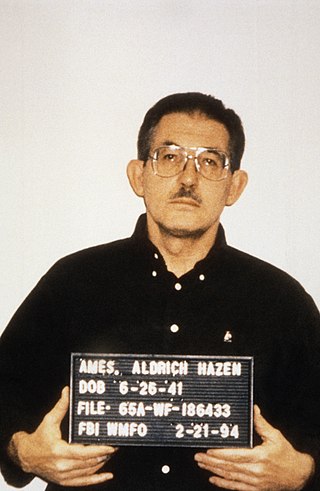
Aldrich Hazen Ames is an American former CIA counterintelligence officer who was convicted of espionage on behalf of the Soviet Union and Russia in 1994. He is serving a life sentence, without the possibility of parole, in the Federal Correctional Institution in Terre Haute, Indiana. Ames was known to have compromised more highly classified CIA assets than any other officer until Robert Hanssen, who was arrested seven years later in 2001.
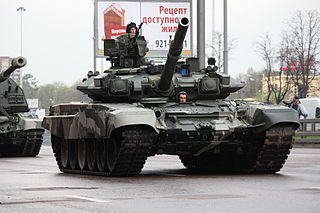
Shtora-1 is an electro-optical active protection system or suite for tanks, designed to disrupt the laser designator and laser rangefinders of incoming anti-tank guided missiles (ATGMs). The system is mounted on the Russian T-80 and T-90 series tanks and the Ukrainian T-84. The existence of Shtora was revealed in 1980 by spy Adolf Tolkachev.
Operation Ivy Bells was a joint United States Navy, Central Intelligence Agency (CIA), and National Security Agency (NSA) mission whose objective was to place wire taps on Soviet underwater communication lines during the Cold War.
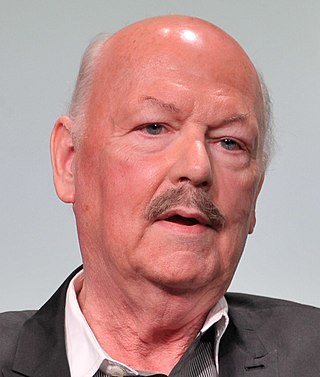
James Bamford is an American author, journalist and documentary producer noted for his writing about United States intelligence agencies, especially the National Security Agency (NSA). The New York Times has called him "the nation's premier journalist on the subject of the National Security Agency" and The New Yorker named him "the NSA's chief chronicler."
Adolf Georgiyevich Tolkachev was a Soviet electronics engineer. He provided vital documents to the United States Central Intelligence Agency (CIA) between 1979 and 1985. Working at the Soviet radar design bureau Phazotron as one of the chief designers, Adolf Tolkachev gave the CIA complete detailed information about projects such as the R-23, R-24, R-33, R-27, and R-60, S-300 missile systems; fighter-interceptor aircraft radars used on the MiG-29, MiG-31, and Su-27; and other avionics. KGB Police executed him in Moscow for being a spy in 1986.
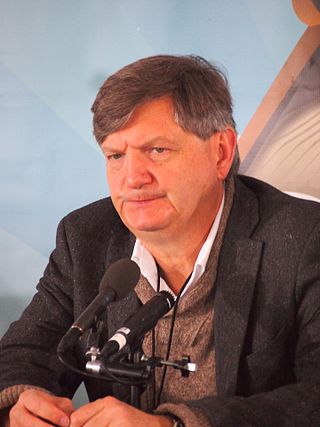
James Risen is an American journalist for The Intercept. He previously worked for The New York Times and before that for Los Angeles Times. He has written or co-written many articles concerning U.S. government activities and is the author or co-author of two books about the Central Intelligence Agency (CIA) and a book about the American public debate about abortion. Risen is a Pulitzer Prize winner.
Michael D. Sallah is an American investigative reporter and non-fiction author who has twice been awarded the Pulitzer Prize.
Arnold Kramish was an American nuclear physicist and author who was associated with the Manhattan Project. While working on the project, he was nearly killed in an accident at the Philadelphia Naval Yard where a prototype thermal diffusion isotope separation device was being constructed. The priest of the Philadelphia Naval Yard offered last rites to Kramish, who refused, as he was Jewish. After World War II, he wrote numerous books on nuclear issues. He is perhaps best known for his book The Griffin - the greatest untold espionage story of World War II, about Paul Rosbaud, who passed important scientific and military information from Germany to the Allies.
James W. Hall III is a former United States Army warrant officer and signals intelligence analyst in Germany who sold eavesdropping and code secrets to East Germany and the Soviet Union from 1983 to 1988.
Fedora was the codename for Aleksey Kulak (1923–1983), a KGB-agent who infiltrated the United Nations during the Cold War. One afternoon in March 1962, Kulak walked into the FBI's NYC field office in broad daylight and offered his services. Kulak told his American handlers there was a KGB mole working at the FBI, leading to a decades-long mole hunt that seriously disrupted the agency. Although the FBI's official position for a few years in the late 1970s and early 1980s was that Fedora had been Kremlin-loyal all along, that position was reversed to its original one in the mid-1980s, and Fedora is now said by the Bureau to have been spying faithfully for the FBI from when he "walked in" in March 1962 until he returned to Moscow for good in 1977.
Eric S. Lipton is a reporter at The New York Times based in the Washington Bureau. He has been a working journalist for three decades, with stints at The Washington Post and the Hartford Courant, and he is also the co-author of a history of the World Trade Center.

Tim Weiner is an American reporter and author. He is the author of five books and co-author of a sixth, and winner of the Pulitzer Prize and National Book Award.
Howard Blum is an American author and journalist. Formerly a reporter for The Village Voice and The New York Times, Blum is a contributing editor at Vanity Fair and the author of several non-fiction books, including the New York Times bestseller and Edgar Award winner American Lightning.
The 2010 Pulitzer Prizes were awarded on Monday, April 12, 2010. In journalism, The Washington Post won four awards while The New York Times won three. For the first time, an online source, ProPublica, won in what had previously been the sole province of print. A musical, Next to Normal, won the Drama award for the first time in 14 years. Country singer-songwriter Hank Williams, who died at age 29 in 1953, received a special citation. The winner(s) in each category are:

The Dead Hand: The Untold Story of the Cold War Arms Race and its Dangerous Legacy is a 2009 book written by David E. Hoffman, a Washington Post contributing editor. It was the winner of the 2010 Pulitzer Prize for General Non-Fiction.
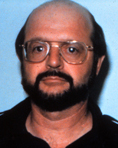
John Anthony Walker Jr. was a United States Navy chief warrant officer and communications specialist convicted of spying for the Soviet Union from 1967 to 1985 and sentenced to life in prison.
David Henry Blee served in the Central Intelligence Agency (CIA) from its founding in 1947 until his 1985 retirement. During World War II in the Office of Strategic Services (OSS), he had worked in Southeast Asia. In the CIA, he served as Chief of Station (COS) in Asia and Africa, starting in the 1950s. He then led the CIA's Near East Division.

The Billion Dollar Spy: A True Story of Cold War Espionage and Betrayal is a non-fiction history book by David E. Hoffman.








